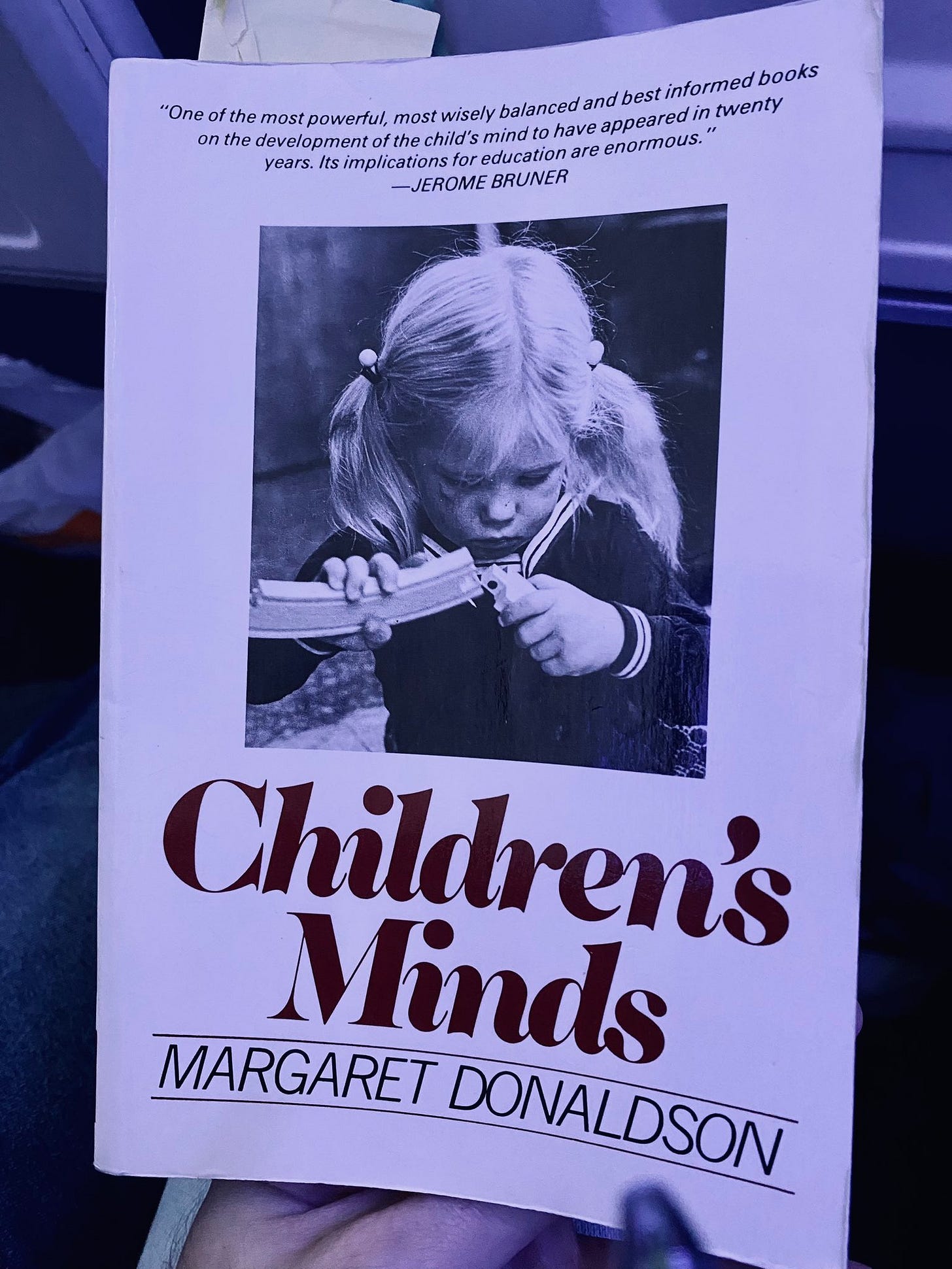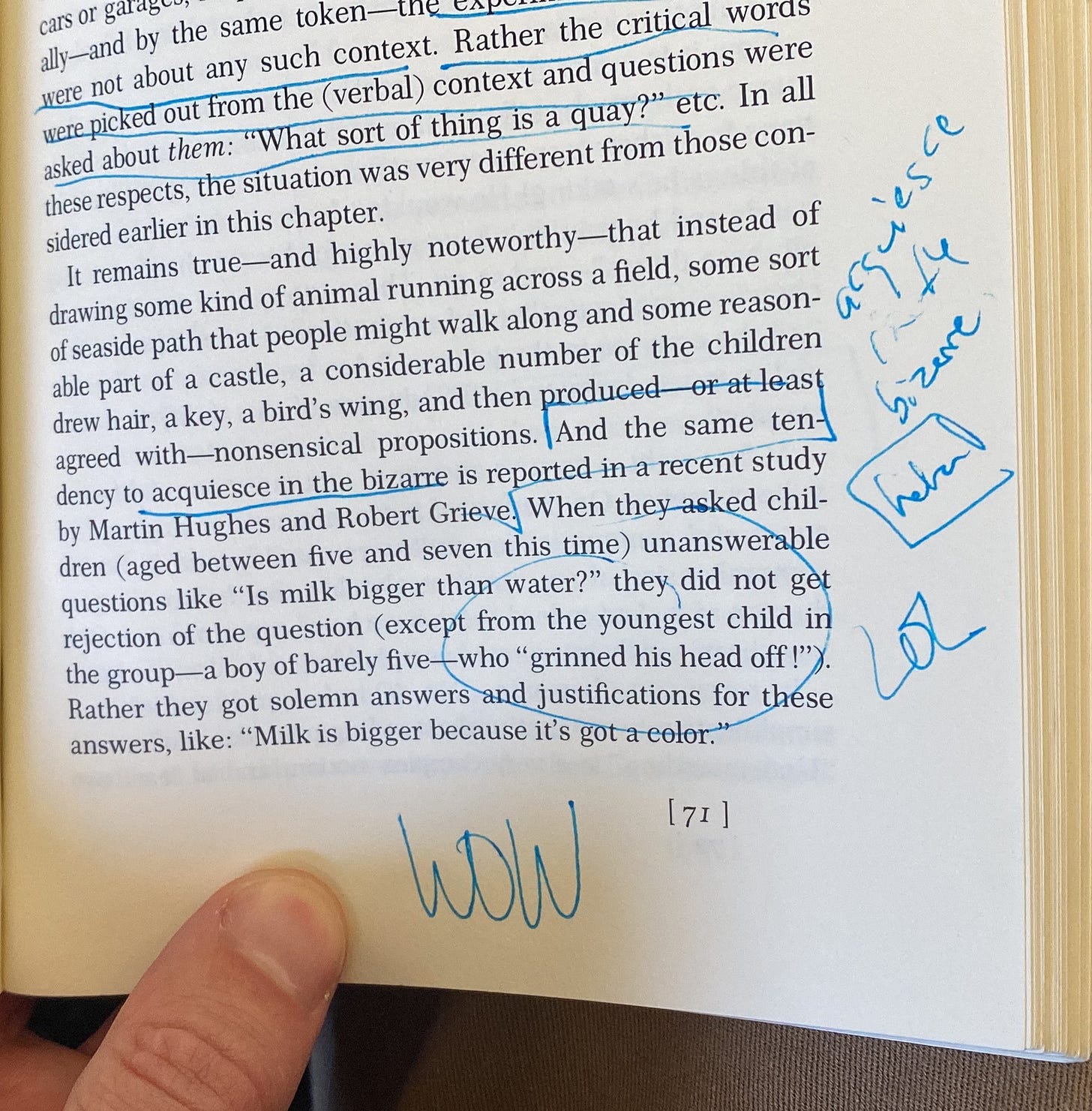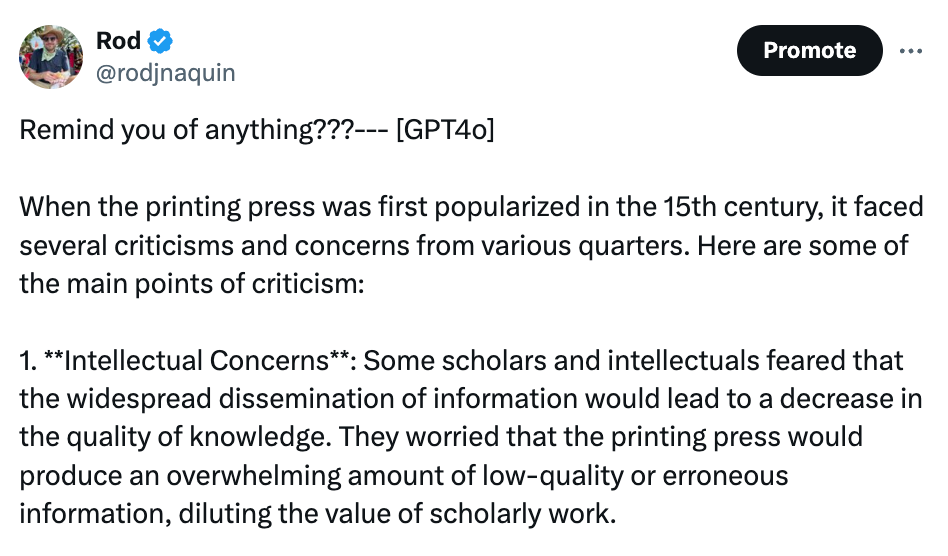For the sake of the learner
LLMs, the teacher's critique, and why it's wrong and anti-learner
Margaret Donaldson’s 1978 book Children’s Minds goes in on Piaget with an outstanding amount of respect. She was a Scottish developmental psychologist who worked with Piaget, studied Vygotsky, and collaborated with Jerome Bruner.
Her critiques of some of Piaget’s absolutist claims around stages and ages of development outlined in this book are pithy, funny and humane. She particularly goes in on preoperational stage speculations for kids 2-7, where Piaget makes (seemingly evidence-based) claims about kids’ difficulties with understanding the perspectives of others.
What I love about her book, especially in light of my parenthood-of-twin-fivesies and ed-reform-from-further-afield-of-the-schoolhouse stages(!) over the last few years, is the deep compassion and empathy for a kid’s situation, context, capacity and dignity. Below is a blurb where she points out that the scientists, academics, adults and older kids happily (and dispiritingly) “acquiesce[d] in the bizarre” nonsense of a constructed scientific experiment—with only the spirited, youngest dude who saw the whole thing as absurd and thus “grinned his head off”!
Her point here is that—this is the kind of evidence Piaget is basing his developmental stage claims upon. At another point (sorry, can’t cite, gave book away), she’s like—if you want to know if kids have a conception of another’s perspective, hang out with kids for five minutes. This is so true—and the further I am from work in school buildings, the more I see schooling institutions in this light: almost totally distorted by conceptions, texts and maxims of adults, boringly and senselessly incoherent for learners.
Objections to LLMs in teaching
I taught for about ten years and led in schools for another five—now I lead and reform from a third-party perspective. But even when I was in schools I felt a bit of an outsider—I wasn’t there because I loved teaching (no shade!), I was there because I loved learning. Part of the reason I’m always drawn to new media and have been very online since like HotDog HTML Editor and ICQ is I live not on bread alone, but the curious impulse of the learner.
So when LLMs emerged in the mainstream in fall of 2022 I was like—wow, okay, let’s see what we can learn with this. And goodness have we been on a journey since then. Yet—understandably enough—just as soon as the tech emerged the doomer critiques proliferated. I’ve been trying to process and understand them for a long while now, and here’s a pretty good rundown of the objections from David Deubelbeiss:
It undermines learners' ability to think for themselves
The language it generates is unnatural and lacks creativity
It enables rampant plagiarism that is hard to detect
It is error-prone and hallucinating false information
It raises equity/inclusion issues due to unequal access
It violates copyright by training on unauthorized data
It is environmentally damaging due to high energy needs
It exploits low-wage labor
It will become expensive once companies start charging for it
It encodes human biases and can be manipulated
It clashes with educational ethics and philosophy
It undermines the human relationships critical to learning
LLMs for the sake of learning
You tell me if you accept all of those claims. Look, I’m a critical thinker myself—about the science of children’s minds or the development of local river systems amongst a billion other things. There is legitimate critique here of high energy needs, but I just tried in good faith to find others listed there I would accept—and there aren’t any…not a single one.
Why? I keep thinking about that little kid in the Donaldson book and the experience of the learner. If you’re a critical thinker, you may have already noticed a trend in the commentariat around LLMs in teaching, learning, reading and writing—it’s that pretty much everything is seen from the teacher’s perspective rather than the learner. Check out this rundown of AI in education for an example of the teacher-centric discourse of LLMs in learning. Donald Clark thoughtfully and smartly pointed out:
This stuff is kind of like the arrow in the FedEx logo—once you see it, you can’t unsee it. If you read Marc Watkins’ blog —which I really appreciate as a formulation of the critical perspective on LLMs in teaching—you’ll see on the surface what seems like legit critique, speculation around impact, and thoughtful, prescient support of students. But that’s not what it is—embedded here is an almost explicit dismissal of the student’s perspective.
In this blog, for example. Marc cautions against adopting LLM support with reading, while reporting that his students overwhelmingly loved the tools. In this one, despite students pushing back against LLM critique seeing it as just another tool, Marc advances the argument that LLMs are merely an attractive shortcut that diminishes student learning.
The same thing happens with the education commentariat tries to reckon with LLM feedback. Just check out the clarity of this comparative example, and the totally obtuse, hypnotized and un-objective wriggling in the thread to dismiss the clear quality of the LLM’s feedback:
Rather than being actually concerned with quality feedback in text, folks vaingloriously recite their preconceptions and biases (as they pretend the models are so biased) while they resist the reality of the sun shining through the window around them. Why? Because just like with the printing press, this scholarly class is worried that their scribbled calligraphy in the marginalia of their illuminated manuscripts… will be displaced by LLM generated text. So they have to pretend that the outputs are bad to make the argument.
I don’t know about you, but if I was the writer there I’d be glad I had better feedback than whatever my teacher conjured. The point here is—this is clear to kids, this is clear to learners. Here’s more evidence—the Walton Family Foundation just put out this report on June 11, 2024 around the Value of AI in Today’s Classrooms, and:
66% believe AI chatbots have had a positive impact on them (page 14).
68% agree that if used to their full potential, AI chatbots can help them learn more and faster (page 44).
80% agree that AI can help provide explanations for complicated concepts they struggle with in school (page 44).
Recall the “grinning” child
Remember our little dude from the Donaldson excerpt? Imagine you’re that learner and your teacher no less is telling you this LLM undermines your ability to think for yourself, that it undermines your relationships, that you’re plagiarizing when you use it, and that learning with it is unethical. I for one would be a little peeved.
Why? Because I’m a learner, and I believe it has a positive impact on my learning, helping me learn more and faster. Just yesterday I was reciting Gail Fairhurst’s scholarship around psychology and discursive leadership with my boss—only because I know it through using LLM reading assistance. Only totally obtuse, vainglorious folks holding on to the preciousness of their own deep, critical understanding—not unlike the luddites after the invention of the printing press—can continue to willfully dismiss learners who say they’re loving the help of a new tool.









Appreciate the reframe on centering the learner’s perspective rather than the teacher’s perspective!